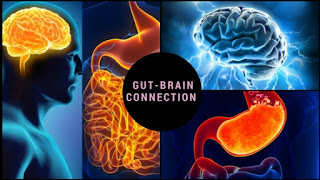The gut-brain connection
Gut-wrenching experience, feeling
queasy, "butterflies" within the stomach - all these expressions are
all for a reason. The gastrointestinal tract is unpretentious to emotion like outrage, uneasiness,
sadness, joy. All of these sentiments (and others) can evoke symptoms within the
intestine. The brain has a coordinate impact on the stomach. For case, the very
thought of eating can discharge the stomach's juices some time recently food
gets there. This association goes the either ways. A bothered intestine can
send signals to the brain, just as a disturbed brain can send signals to the
intestine. In this manner, a person's stomach or intestinal trouble can be the
cause or the item of anxiety, stretch, or sadness. That's since the brain and
the gastrointestinal (GI) system are intimately connected.
Psychosocial variables impact the actual physiology of the
intestine, as well as side effects. In other words, stress (or sadness or other
psychological variables) can influence development and contractions of the GI
tract, make irritation more awful, or maybe make more helpless to infection. In
addition to this, research also proposes that a few individuals with functional
GI
disorders see torment more intensely than other individuals do because
their brains don't appropriately direct pain signals from the GI tract. Stress
can make the existing pain appear indeed worse.
Physical symptoms:
·
Stiff or tense muscles, especially in the neck and
shoulders
·
Headaches
·
Sleep problems
·
Shakiness or tremors
·
Weight loss or gain
·
Restlessness
Behavioural symptoms:
·
Procrastination
·
Grinding teeth
·
Difficulty completing work assignments
·
Changes in the amount of alcohol or food you
consume
·
Taking up smoking, or smoking more than usual
·
Increased desire to be with or withdraw from others
·
Rumination (frequent talking or brooding about stressful
situations)
Emotional symptoms:
·
Crying
·
Overwhelming sense of tension or pressure
·
Trouble relaxing
·
Nervousness
·
Quick temper
·
Depression
·
Poor concentration
·
Trouble remembering things
·
Loss of sense of humor
·
Indecisiveness
According to studies\survey, patients who tried psychologically based
approaches had more enhancement in their digestive symptoms compared with
patients who received only conventional therapeutic treatment. Together we can come
up with strategies to assist us to deal with the stressors within the life, and
also ease the stomach related distresses.





Comments
Post a Comment